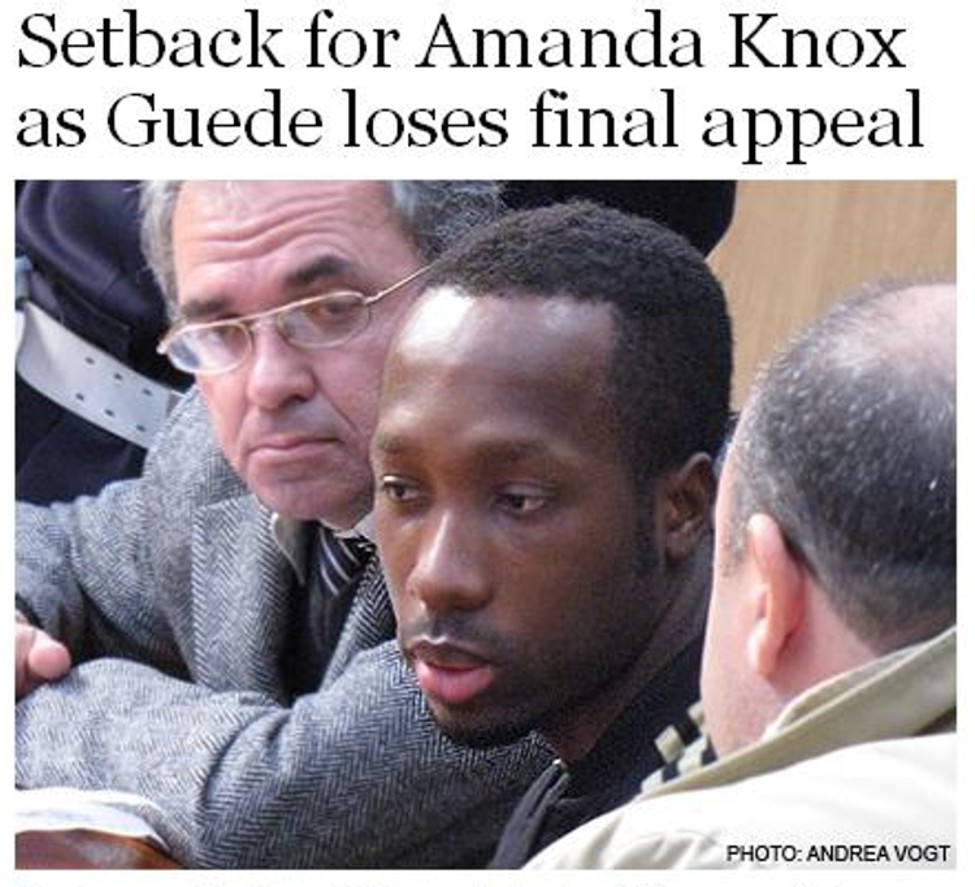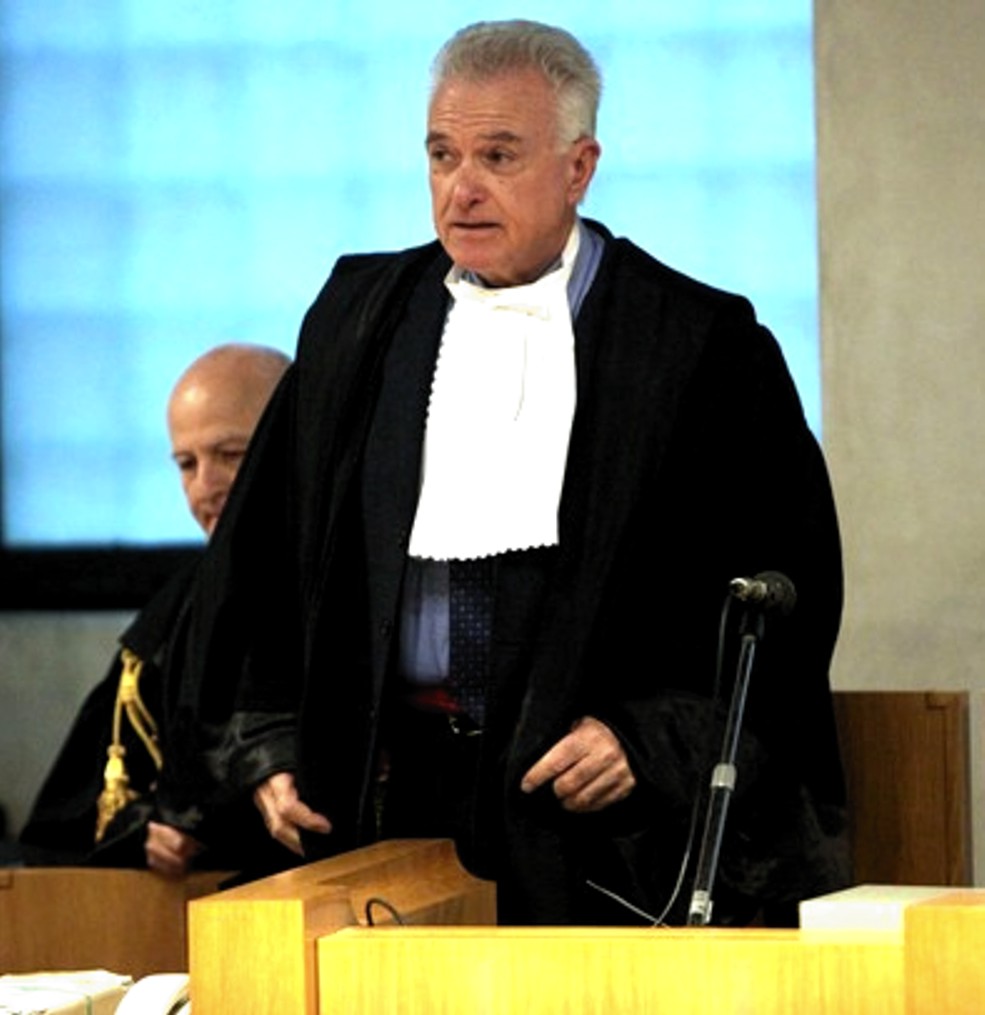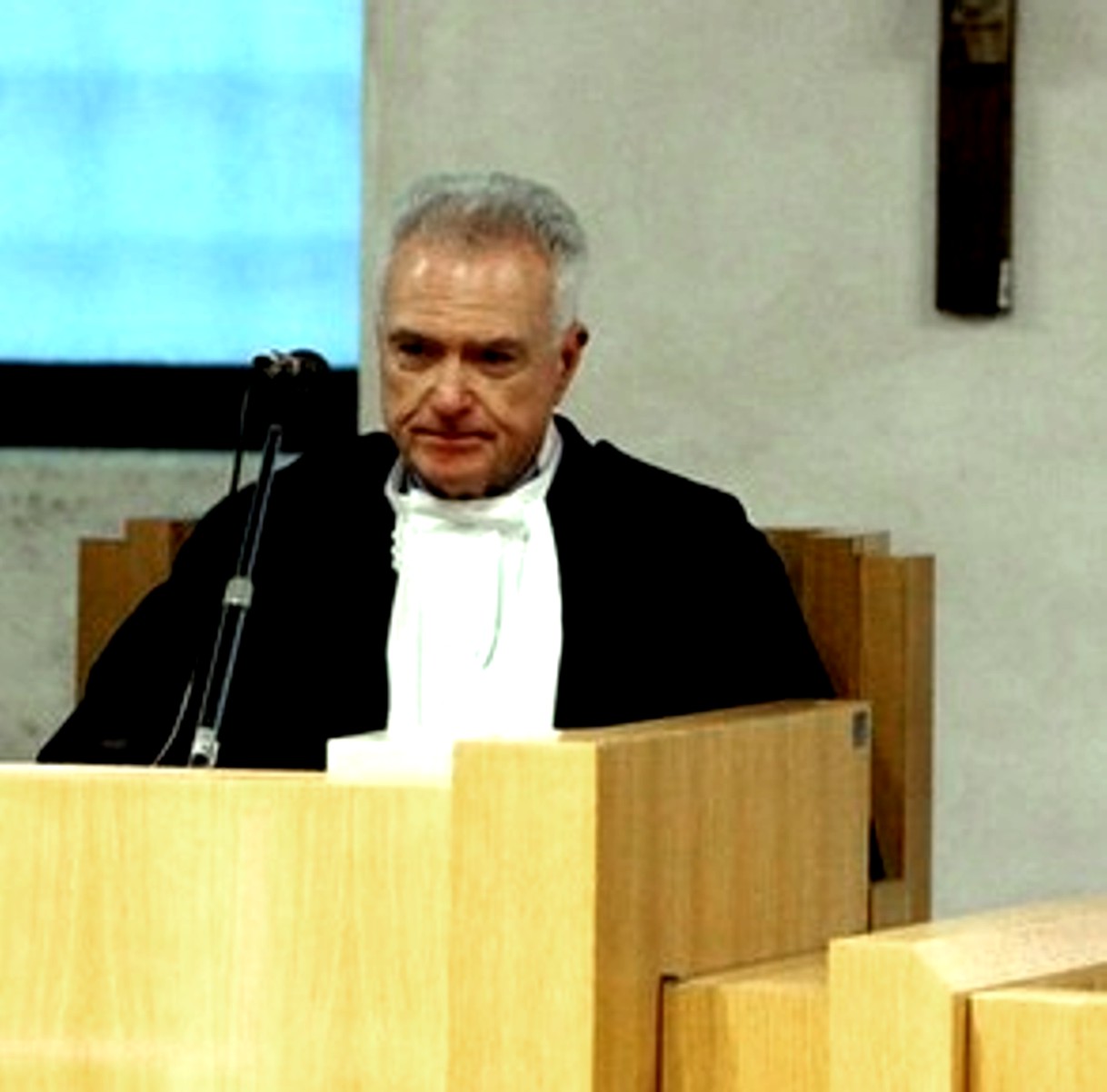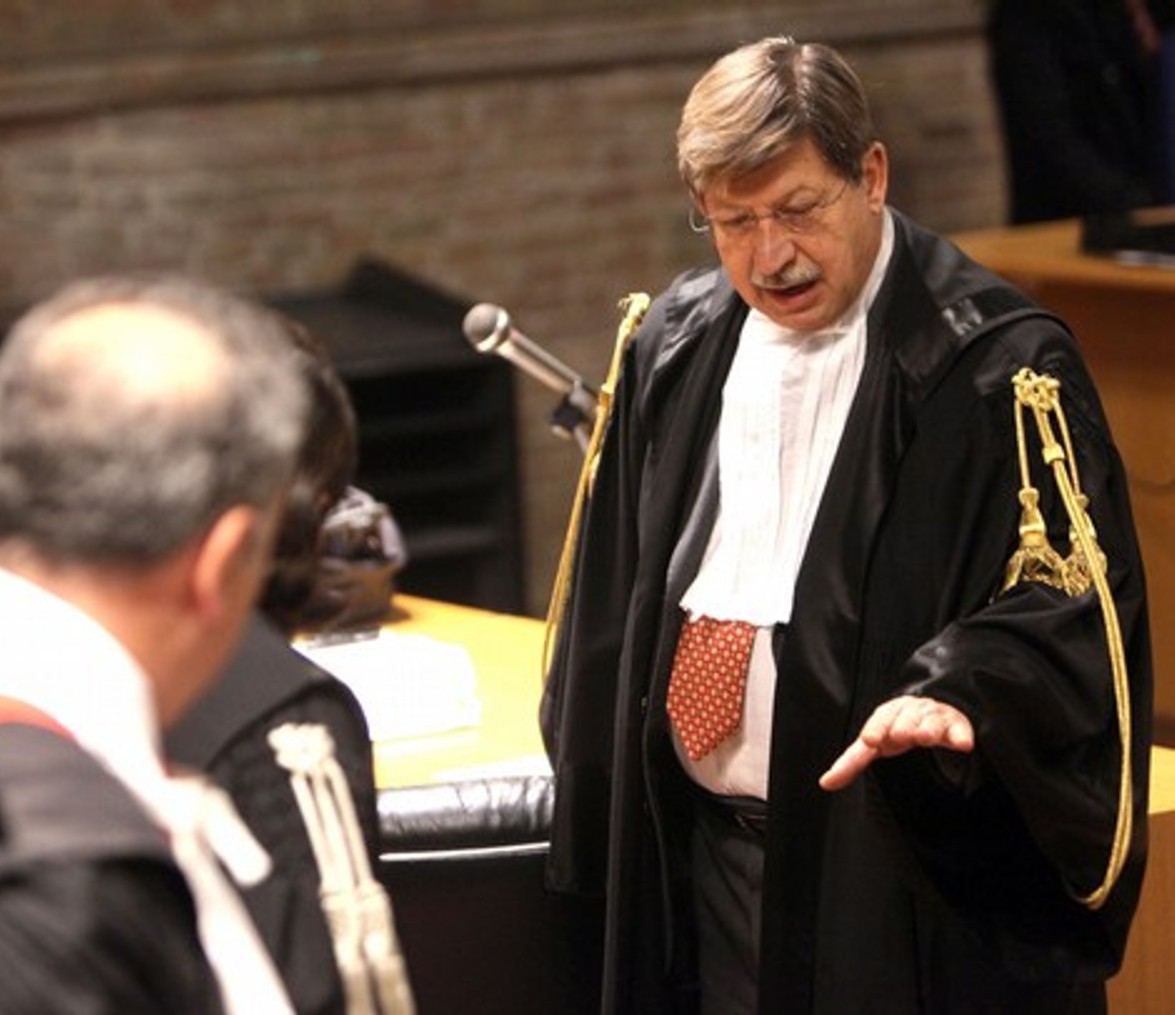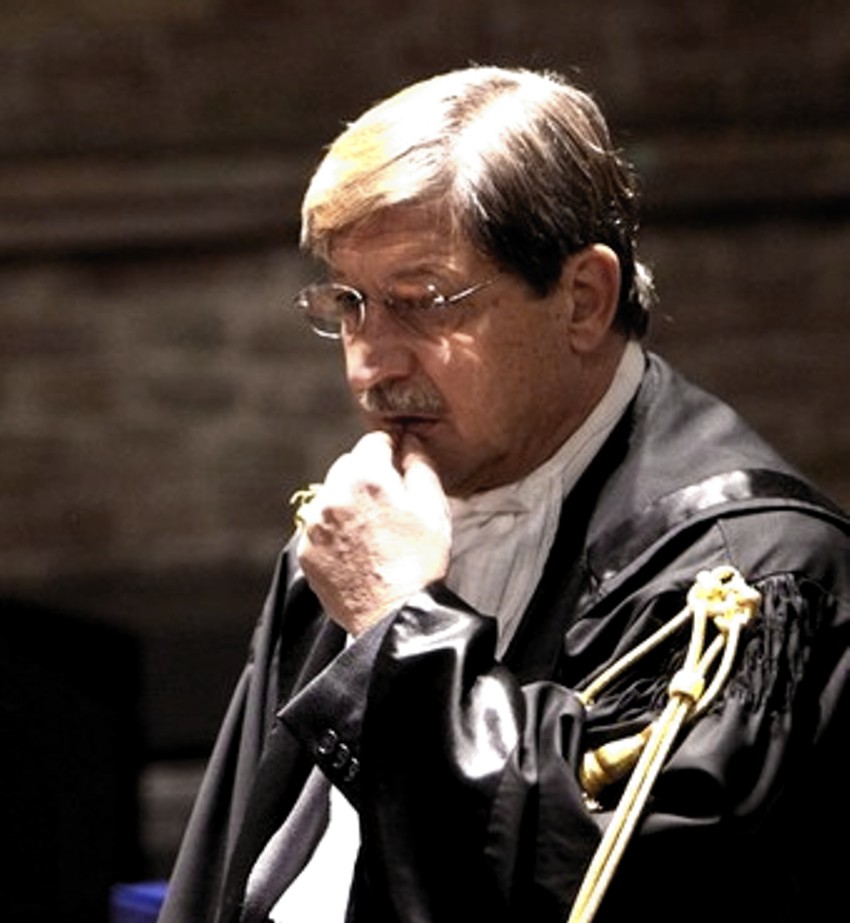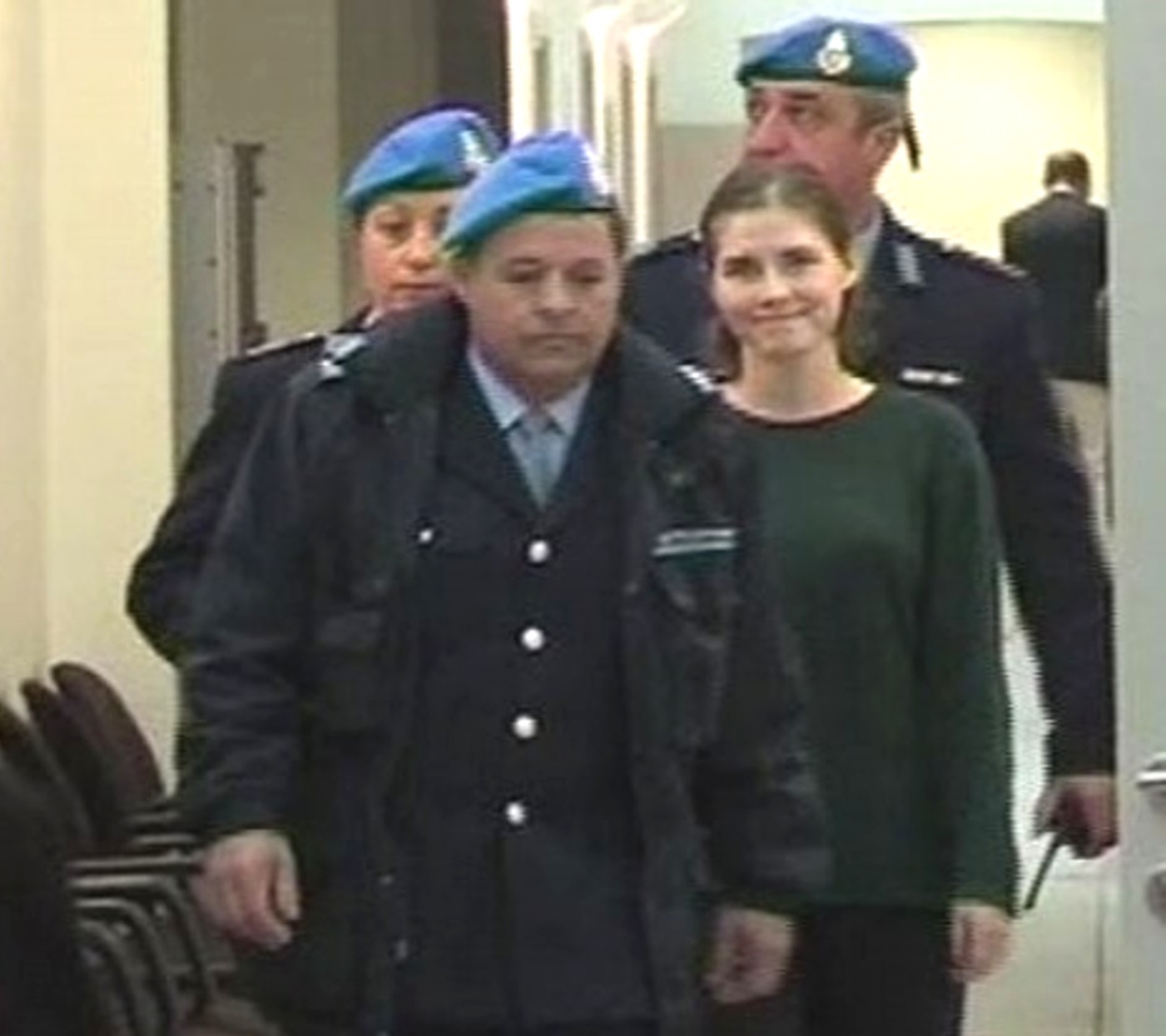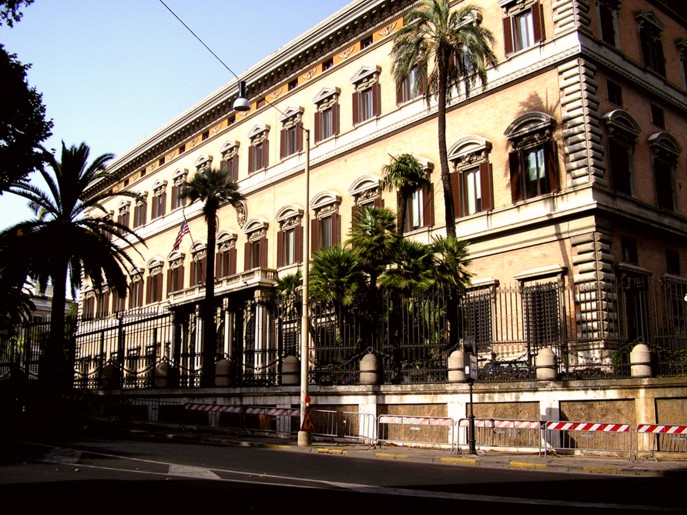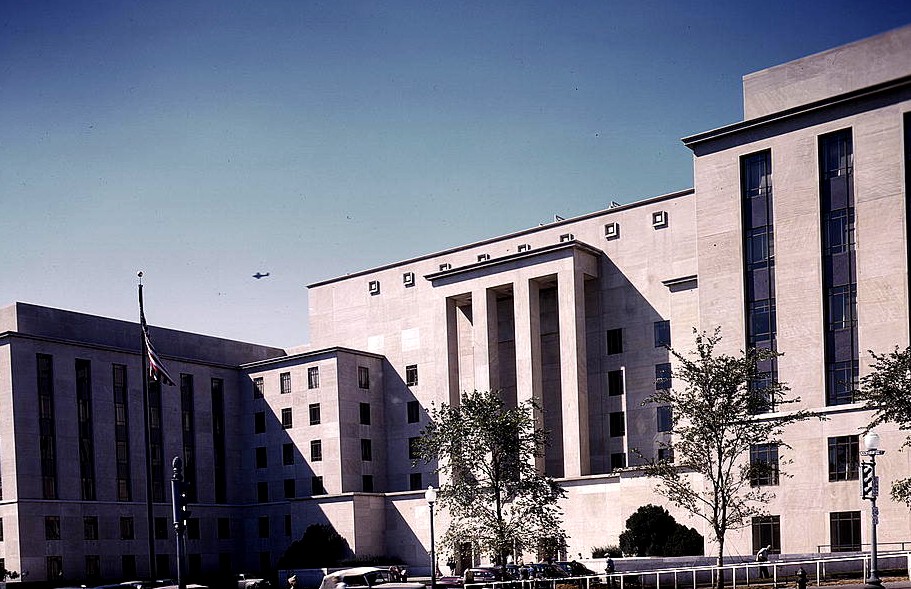
Category: Appeals 2009-2015
Saturday, December 18, 2010
The Appeal’s Set Limits: What The Judges Allowed Today And Didn’t Might Tell Us A Lot
Posted by TomM
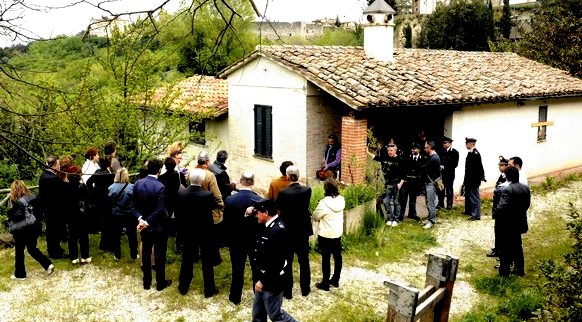
[Massei court deciding whether to buy spiderman theory; they didn’t]
1. The Context Of These Remarks
The judge ruled on the appeal’s inclusions and exclusions today. I’ll summarise what they are and how American courts might have differed.
I really do not understand why the defense and the family are so happy with this review, which is very limited and not complete in any sense - other than, perhaps, the “any port in a storm” phenomenon.
From my view in the bleachers, there are way more risks to the defense than to the prosecution from Saturday’s rulings.
2. What’s Allowed In Italian Appeals V. American
As a California lawyer familiar with trials and appeals in my state, watching the Meredith Kercher murder trial wind its way through the Italian legal system has been a learning experience.
It is a system with more protections than the one I know first-hand. The case is now in its first appeal phase, and proceeds far differently from the way it would in the US.
- If Knox and Sollecito had been convicted in an American court (which an American court would have had no difficulty in doing) less helpful presumptions would be applied to their appeal.
- In Italy they are convicted, and for that reason they are imprisoned and the visitation privileges they had before the jury’s verdict have been reduced. But for purposes of weighing the evidence in the appeal, they are presumed innocent.
- In the US, the court of appeal would not presume them innocent or guilty; it would regard them as having been adjudged guilty.
- In Italy, they can ask for the court of appeal to hear testimony from new witnesses and seek to introduce additional evidence.
- In the US, the appeal would be on the basis of the clerk’s and reporter’s transcripts of the trial. In the US the jury at the original trial would have been instructed that if an item of evidence can be interpreted two ways, one favoring guilt and one favoring innocence, they should accept the interpretation that favors innocence. But not so on appeal; the court of appeal would interpret all the inferences from the evidence in the light most favorable to the prosecution.
- An American court of appeal would not consider an attack on the credibility of a witness unless the testimony was such that no reasonable person would believe the testimony.Thus, an attack on the testimony of Curatolo would have no chance of success on appeal. In fact, jury instruction in the US would give the jury blessing to believe him even absent disco buses running that fatal night.
From a form jury instruction on how to judge witness credibility:
“Do not automatically reject testimony just because of inconsistencies or conflicts. Consider whether the differences are important or not. People sometimes honestly forget things or make mistakes about what they remember. Also, two people may witness the same event yet see or hear it differently.”
The Italian appeal is described as a “trial de novo”.
- In common law jurisprudence, a trial de novo is simply a new trial, and the jury in a new trial would not even be told of the existence of the first trial. It would be done as if the first trial never happened.
- Not so in Italy. The jury and lay judges have full access to the case dossier, the Massei Motivazione, and the briefs of the parties. They decide which parts of the case should receive new evidence, and the parts where none is needed. If that were not the case, they would not know how to respond to the defense requests.
3. Tellingly, What Court Has NOT Re-opened
1. Staging Of Burglary
It is significant that there is no re-visit on the staging of the burglary. This charge is not just one of the things used to prove the murder, it is also a separate charge which does not require that a person also have participated in the murder.
Let’s suspend disbelief a moment. Suppose AK and RS had not been present during the murder, having ducked out briefly to get more drugs, but returned to discover Meredith’s body.
Suppose they thought they would be suspects because they had let Rudy in and feared they would be blamed, so they staged the burglary to divert suspicion from themselves. In this hypothetical situation, they are still guilty of staging a burglary even if they didn’t otherwise participate in the crime.
So, what to make out of the fact that no further evaluation will be made of the staging?
This seems like the easiest of the charges to prove and the most difficult to defend. Staging is a recognized phenomenon in criminal investigations and the defense expert did not fare well under cross-examination. I don’t see how the court would reverse the judgment on this issue given the state of the record.
2. Collection Of DNA
Defense criticized the way the dna was collected from the bidet, but there will be no review of that evidence - or of any other of the mixed blood/dna evidence - only the knife and the bra clasp.
If the appellate jurors’ inclination were to think there is reasonable doubt on the dna, there is plenty of defense expert testimony to hang that hat on. That only two of the exhibits will be studied shows that they do not question the work of the scientific police as a whole.
4. The Pattern Of Sorts In These Rulings
From my own experience, I firmly believe that Hellman has not made up his mind on the final outcome. That doesn’t mean he doesn’t know what he thinks the jury will do with the case.
He clearly knows the case, and I think he knows if there are areas in Massei’s reasoning that have vulnerabilities (not necessarily fatal) that could attract attention in the Court of Cassation.
I think he knows whether the prosecution’s case is a house of cards, or if it is a good case with some curable cosmetic flaws.
To me, the rulings look like the judge has reviewed the case, thinks it is fundamentally sound, and believes it will be backed up by unbiased expert opinion - and if it doesn’t, he will assess what impact that has on the case.
The issue with respect to the scientific police is not that they were biased in the sense of falsifying evidence to wrongfully convict, but that the video of the crime scene investigation showed non-textbook acts, Stefanoni didn’t leave a complete paper trail in testing the knife, and they failed to collect and correctly bag the bra clasp at the beginning.
All of which left an opening for the defense to claim the dna evidence is suspect. There is a reason why teachers don’t let students grade their own papers, I think that concept is behind Hellman’s decision to seek an unbiased review of these two items.
5. No Signs Of Exoneration In Rulings
If Rudy Guede testifies and gives a believable narrative, it may not matter what the two dna reviews say, and it might also undermine the jurors’ inclination to accept the theory of remorse from the covering with the quilt that persuaded Massei to reduce the sentence.
An increased sentence is not out of the question.
As I said at the top, I really do not understand why the defense and the family are so happy with this review, which is very limited and not complete in any sense - other than, perhaps, the “any port in a storm” phenomenon.
The bra clasp evidence is not going to go away, and there is the risk that increased technical sophistication could result in identifying a complete dna profile of Amada Knox on it. If they disassemble the knife, there could be abundant blood between the handle and the blade.
Again, from my view in the bleachers, there are way more risks to the defense than to the prosecution from Saturday’s rulings.
Friday, December 17, 2010
Stinging Guede Final Appeal Rejection Suggests Trouble For Knox and Sollecito
Posted by Peter Quennell
Rudy Guede’s appeal is rejected on all ten grounds.
His appeal grounds were ugly and dishonest and he has no further appeal. He will serve his 16 years, with maybe some time off, for being a savage willing party to the cruel stupid murder of Meredith.
Rudy Guede will go down in infamy for his sex crime against a defenseless victim, for being a party to a taunting torturing knife attack, for claiming Meredith invited him in for consensual sex, and for not calling for help for Meredith and maybe saving her life while it was still possible.
Cassation continues the fine Italian court tradition in this case of taking a firm and unblinking position, and for being utterly oblivious to the vile over-the-top campaign of Curt Knox, Edda Mellas and David Marriott which may now haunt Amanda Knox all of her life..
This is clearly not a final court of appeal that is now going to turn on a dime and say when they hear the final appeals of Amanda Knox and Raffaele Sollecito, oh, of course, we got that previous decision wrong, and of course Guede did it alone.
Here is the cool clear report of Andrea Vogt, this time being published in the UK’s First Post. The highlights:
1) On rejecting Guede’s ludicrous tale.
Put simply, no judge or magistrate has believed Guede’s story that he was in the bathroom of the apartment the two girls shared in Perugia, listening to music on his iPod while someone else stabbed Meredith.
According to Guede’s story, when he came out of the bathroom he found Meredith bleeding to death and tried to staunch the flow of blood ““ hence the discovery of his DNA by investigators.
2) On the huge new risk now for Sollecito and Knox.
Under Italian law, all documentation from Guede’s various hearings can now be introduced into the appeal trial of Knox and her former boyfriend, Raffaele Sollecito, which reconvenes in Perugia tomorrow.
The problem for Knox and Sollecito is that Guede’s trial documents will include the judges’ reasons for convicting Guede and denying his appeals: namely, that they believe all three ““ Guede, Knox and Sollecito - killed Meredith together.
3) On Kercher family lawyer Maresca possibly demanding Guede testify
“Guede can now be called to testify and we are considering, along with the prosecutors, if we will request that Saturday or not,” said the Kercher family’s attorney Francesco Maresca in Rome.
“We will ask that the high court decision be admitted, as it stabilises the facts and is an important point of reference, with judges confirming the reconstruction of events and the involvement of the other two suspects in this dramatic ordeal in which a young woman lost her life.”
If Guede is called, it is unclear whether he would be considered a reliable witness given that no court has believed his story so far. And the situation is further complicated by conflicting stories about Guede’s take on Knox and Sollecito.
4) On the prospects for requested defense witnesses Alessi and Aviello
Guede is also the subject of a mysterious 10-page letter from prison, written on blue notepaper in the feathery script of convicted child murderer Mario Alessi, and now sitting in a lawyer’s office in Parma.
Alessi claims to have heard the real story of what happened while stuck in a prison cell across from Guede. Three other inmates signed each page of Alessi’s letter bolstering his story - that Guede said repeatedly in his cell and the prison yard that Knox and Sollecito had nothing to do with the crime. (Guede denies the conversations)...
Will the judge overseeing Knox and Sollecito’s appeal in Perugia request it? If he does, it could be entered into evidence alongside further controversial letters, these from a Neapolitan mafia snitch named Luciano Aviello. Aviello claims that his own brother killed Kercher…
Since Knox and Sollecito were convicted and jailed a year ago.. these stories of intrigue have found their way out from behind the prison walls across Italy, from the sex offender ward in Viterbo to the high security penitentiaries in Prato and Turin.
5) And on John Kercher’s recent strong protest against the profiting from Meredith’s death
Meredith Kercher’s bereaved family this month broke a three-year silence to speak out against Knox’s “minor celebrity” status and the high-profile publicity campaign her family and supporters have been waging to claim wrongful conviction.
Tuesday, December 07, 2010
Andrea Vogt Provides Heads-Up On What May Happen In The Appeal
Posted by Peter Quennell
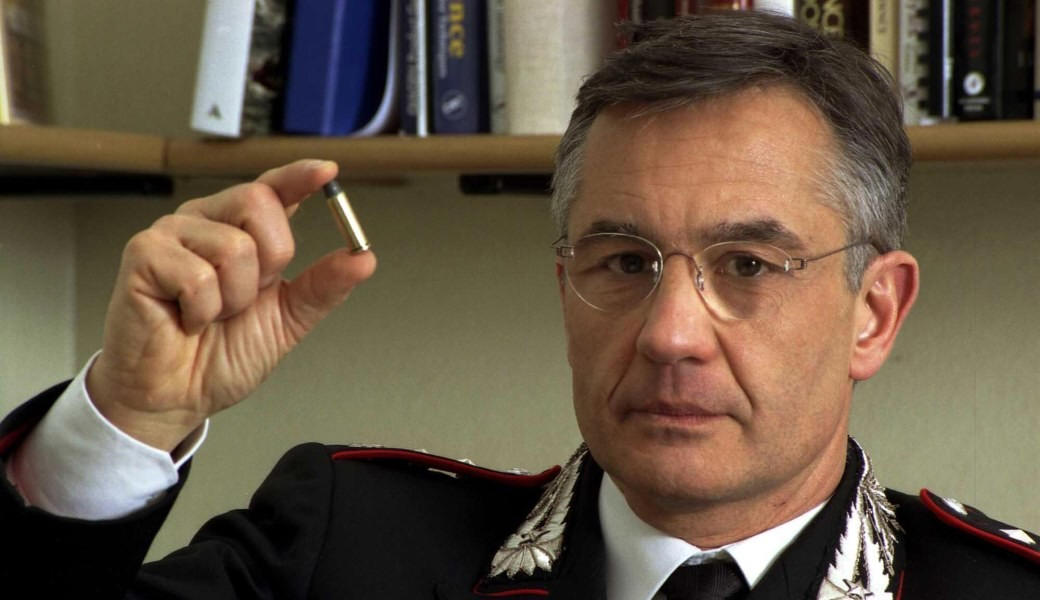
Luciano Garofano created Carabinieri DNA labs; quote below
Update On Pending RS And AK Appeal
Another of the many very informative reports that have appeared on the Seattle PI website.
A mild qualification up front is that we would have liked it mentioned that the prosecution have also initiated an appeal, to throw out the “mitigating circumstances” outlined in the Massei Report.
A reversal on the mitigating circumstances, which we too have always found problematical, could result in all three serving longer time. What the prosecution will come out with in that phase is a real sleeper in this appeal.
1. On John Kerchers article protesting the over-the-top PR campaign
The Kerchers have maintained their silence since their daughter’s murder, even as Knox’s parents appeared on national television in the United Kingdom, the U.S. and Italy. But that could change, as negotiations are under way with at least one national network to hear the Kerchers’ side of the story.
Correct and accurate. More on Meredith would be so welcome to an American audience. We reposted John Kercher’s hard-hitting article here in English and (as the Italian media mostly don’t yet know about it) here translated into Italian.
Biased reports like those of the ill-researched Nikki Batiste of ABC, which mis-stated and ridiculed John Kercher’s claims, omitted to say what Andrea Vogt says: this is THE FIRST TIME that John Kercher has gone public, in an attempt to stop the depraved multi-million-dollar deluge.
2. On the chances of an overturn of the December 2009 verdicts.
American pundits are quick to predict Knox could walk, but Italian legal experts say the chances of completely overturning her conviction aren’t good. More likely, they say, are the prospects of a sentence reduction.
“The Knox trial is one of the few, in the history of Italian criminal justice, in which over 25 judges have agreed—at different stages—on the adverse impact of the collected evidence against the positions of both Knox and Sollecito. In this respect, the case is rather unusual, as Italian justice is often characterised by conflicting decisions of courts on the same case,” said Stefano Maffei, an Oxford-educated professor of criminal law in Italy interviewed by seattlepi.com.
“What I can confirm is that courts of appeal are generally more lenient than courts of first instance, and I would not be surprised if the decision on appeal could bear a lower sentence for both defendants.”
The point is made up at the top here that this report does not mention the appeal of the prosecution for tougher sentences , which would seem to effectively balance out the probabilities that Mr Maffei and all the defenses now claim.
The sheer number of judges that all of them agreed on the evidence in this case is particularly damning. Our own Italian lawyers between them know of ZERO cases where so many judges in succession have found no reason to reverse any part of the process.
We have posted a number of good descriptions of how the Italian process actually works (these go beyond the descriptions in ANY British or American reporting, another sign of how sloppy it has mostly been), and our key posts can be seen here and here and here.
3. On the requested defense witness Mario Alessi
In a file tucked neatly under a polished glass paperweight in Laura Ferraboschi’s Parma law offices is a carefully guarded letter that Knox and Sollecito hope will set them free.
It is 10 pages, handwritten in the small, tilted script of Mario Alessi, a convicted murderer who had the prison cell across from Rudy Guede in the sex crimes ward of a tough prison just north of Rome….
Alessi mailed his statement to her for safekeeping after becoming concerned it might “disappear,” she said…. Sollecito’s lawyers, eager to have the letter at their disposition, asked Ferraboschi to share it, but she has refused, saying she did not feel it would be ethical to do so.
“Alessi sent the statement to me for protection, and I do not feel it is appropriate to give it to other lawyers who might drag him into a case that could negatively impact him,” Ferraboschi said. “If a judge requests the statement or his presence, then we will provide it.”
Good luck on that one. We doubt Alessi ever makes the stand. Here is our most recent post on Mario Alessi which links back to several that went before.
Prosecutors Mignini and Comodi also interviewed Alessi. They have not yet made public what he said.
Investigators and prison staff would have checked Alessi out very carefully. Laura Ferraboschi seems to be hanging firm on not sharing the letter, out of concern that Alessi could incure a charge of perjury.
4. On the requested defense witness Luciano Aviello
The second series of jailhouse “revelations” are from Luciano Aviello, a Mafia turncoat from Naples who shared a cell in Terni with Raffaele Sollecito. Knox’s lawyers went to videotape a statement from him in prison near Turin in March, a month after Bongiorno had videotaped Alessi’s statement in Viterbo.
He wrote several letters to the court last year. In the most recent statement, he claims he can prove all three people in jail for Kercher’s murder are innocent. It was his own brother, he says, who killed her. Aviello…
Aviello said his brother killed Kercher in a robbery gone awry, then asked Aviello to hide a bloody knife and set of house keys. Kercher’s set of house keys have not been found.
Good luck on that one too. We doubt that Aviello too ever makes the stand.
In our most recent post on him here we remarked that, with this guy, the defense was already seriously grasping at straws. We are amazed that they still want to wheel him out. That weak move does not bode well for Knox and Sollecito.
5. On the requests for more testing of the DNA
Repeatedly, judges have rejected defense arguments about the forensic evidence despite the slipshod way it was processed and Italy’s reputation of lagging behind the rest of Europe in DNA certification, handling protocols and databasing.
Many outside observers believe the court should allow for such an independent review, given the number of protocol mistakes revealed in the first trial.
Defense attorneys and their expert witnesses heavily criticized the work of police biologist Patrizia Stefanoni and the Perugia and Rome forensic teams working under her direction for such missteps as not changing gloves after picking up evidence, poor collection methods and incomplete records of how evidence was handled and in what exact order during later laboratory testing….
Two of the primary pieces of evidence against Knox and Sollecito are highly contested: A bra clasp originally catalogued in the first days after the murder that was picked up in a sweep of the crime scene 46 days later, and the kitchen knife with Knox’s DNA found on the handle and the victim’s DNA found on the blade. The bra clasp is said to contain Sollecito’s DNA. The amount of Kercher’s DNA found on the blade was such a trace amount it registered with a “too low” reading when analyzed.
Our DNA section on TJMK is very complete and to a very high standard. The three posts here and here and here are particularly worth a very careful read.
More tests had already been denied by Judge Massei. Defenses tend to like to do this, to keep insisting on more and more testing, until finally with luck an expert breaks their way.
The defense now “highly contests” the testing but they also attempted that throughout the trial and several of their experts under cross-examination had to take a step back.
Experts were invited to the one-time-only DNA testing of the knife and then (surprise, surprise) on the day of testing not all of them showed up.
And on whether Italy lags behind the rest of Europe on standards, see below (Italy doesn’t)..
6. On the standards of the laboratories that did the testing
A top geneticist at one of Europe’s top forensic labs at the University of Salzburg confirmed in an interview with seattlepi.com that it is possible to amplify such a small amount of DNA, as Stefanoni did, until DNA can be identified. But the expert added that it would not be allowable unless the result could be reproduced, something police biologist Stefanoni said under cross-examination could not be done.
The Salzburg geneticist, who does forensic testing for police agencies in neighboring Austria, said that in the university’s certified lab (which has the highest certification available in Germany and Austria) different operators are required to handle suspect and victim DNA and that the various phases of DNA analysis happen in different labs along a “one-way street” to avoid the possibility of contamination.
Such protocols were not in place in Rome. In fact, Italy is noted for being behind on international forensic standards. For example, it is one of the last (and only) European countries to have not yet become part of the Prum convention, which sets basic guidelines for sharing of DNA data and other security information.
The top geneticist at Salzburg University is unfortunately not named, presumably at his request, and there have been so many claims by both anonymous and unqualified self-proclaimed experts throughout this case that we wish he had said that yes, he could be named.
The Rome labs were in fact being operated to international standard and they had followed the European protocols for years. When they were only recently certified to European standards, none of the procedures or the training or the layout of the labs had to be changed.
Perhaps the top geneticist should have mentioned this.
7. And on the views of renowned forensic scientists Luciano Garofano
One of Italy’s top forensic biologists, retired Caribinieri General Luciano Garofano, is at the forefront of the push to introduce a national database and DNA certification standard in Italy. Garofano (a member of the American Academy of Forensic Sciences who collaborated frequently with the FBI over the years as a high-ranking Caribinieri military officer) analyzed the forensic evidence in the Perugia case for a book released shortly after the trial was complete.
He believes Knox was involved in the murder, but he disagreed with the court’s conclusion that Kercher was sexually assaulted—he is convinced Kercher’s death was a fight that degenerated, then later staged as a rape.
Interviewed by seattlepi.com, Garofano said his read of Knox’s appeal was that it was mostly a rehashing of “points that have already been debated…. The knife is a weak element . . . they could argue it should be thrown out because the amount of DNA does not meet international forensic standards. But that still leaves a lot of other evidence,” Garofano said.
“I do not believe there is enough there to convince an Italian magistrate and jury to overturn this conviction.”
Terrific comments. Hard to see why either Knox or Sollecito deserve even the slightest reduction of their sentence. Neither of them has come up with a consistent explanation, both of them seem to have shown some glee, and neither has shown the slightest sign of repentance.
If they tortured and killed Meredith in a particularly cruel and barbaric way, as it seems, then they both seriously need to serve the time.
Monday, December 06, 2010
Will Sollecito And Knox Finally Want To Take The Stand? Why Our Betting Is Against
Posted by Kermit
The Massei Report makes nothing of the fact that Amanda Knox and Raffaele Sollecito did not rise under oath in their defense.
But if that made zero impact on the perceptions of the judges and lay judges, we would be very surprised. There are VERY few cases in the US or Europe where an INNOCENT defendant (1) rose to testify, (2) was then found guilty and sentenced, and (3) and was later found to be innocent after all.
Raffaele Sollecito never ever took the stand. He confined himself to some spontaneous remarks not under oath which is permitted in Italian courtrooms. They seemed not at all effective and they sure didn’t eliminate at all the 80,000 pound gorilla of evidence that the prosecution had let loose in the room.
Amanda Knox made similar spontaneous remarks, none of which seemed very helpful - the first was to jokingly explain why her bunny vibrator was always on view in the bathroom that she and Meredith shared.
The Knox testimony seen here was not a part of the main trial - it was offered ONLY to explain why Knox implicated Patrick Lumumba, and under the agreed rules for that testimony, the prosecution’s questioning was very circumscribed and curtailed.
Despite that, Amanda Knox seemed to do herself little real good on the stand, and in her second day there she sounded amused and very callous about the death of Meredith.
Please click here for 150 questions for Amanda Knox which should open in Powerpoint in half a minute. They show how blistering a full-blown prosecution cross-examination really could be.
Actually it could be even tougher. Those questions were assembled 18 months ago - and in the months after, we had the hesitant and nervous defense phase, the very strong prosecution summation, and the implacable Massei Report.
We could probable triple the questions for Knox now, and create a similar list for Sollecito. If he is given the chance to cross-examine the two, Prosecutor Giancarlo Costagliola very well may triple them.
The defenses have very few rounds of ammunition going into this appeal - the anti-Guede witness Alessi is a joke, and the DNA and forensic tests were all done fine the first time and have never been proved - despite all the smoke being blown - to be false or falsified.
So will they or wont they take the stand?
They seem cooked if they do - and cooked if they don’t. Tough call.
Sunday, November 28, 2010
The Knox Team Makes A Loud Blustery Attempt To Put Lipstick On Its Pig Of A Defense DRAFT
Posted by Peter Quennell
The issues they have to confront include the dramatic changes to her stories, a complete lack of any alibi, the staged break-in, the evidence of mixed DNA (hers and the victim’s), and the proven lies about her activity on the morning after the murder. Taking the court of appeal on a magical mystery tour of a missing knife is nothing more than a distraction.
A court can only strive to establish a motive but, if it’s clear that those tried are guilty, then the motive is not the be all end all.
The most important thing about motive is assessing it in order to determine what the risk is, in future, of the offender repeating the crimes and in murder, especially, what the dangers will be to society.
“Motive” is not an element of the crime. Prosecutors prefer to have a motive because it ads to proof of guilt, but it doesn’t need to be proved. “Intent” is not the same thing “motive.” Intent is an element of first degree murder in common law jurisdictions.
So, media coverage causes unfair trials? Those who endured Stalin’s secret trials might be surprised to know about this. Would a complete media blackout have changed any of the evidence used to convict the two young adults?
It’s ironic that Curt and Edda and the FOA complain about the media influencing the judges and jury in this case when they have done their utmost to influence the legal proceedings in Perugia through the media.
Knox on stand
sure hope Knox’s lawyers aren’t hinging their entire case on the possibility of a second knife existing or not. That’s somewhat beyond belief. They have to deal with the knife that does have her DNA on the handle and Meredith’s on the blade. Mocking the judge for introducing a second knife that wasn’t found sounds like desperation.
The other thing they’re apparently focusing on is lack of motive. This too is a mistake. She’s a quirky Seattlite who conducts sing-a-longs in the courtroom at her own murder trial. And you’re going to ask the appeal court to look deeper for a motive?
I agree that attacking the conviction on the basis of a second knife and motive seems incredibly lame. The evidence you cite is a huge hurdle to get over. They don’t just need to score one or two points (they will probably do so) but address many, many inconsistencies. There are so many strands to this particular web they have woven, and some huge holes in it they have to fill in order to be ‘let off’. I would be astonished if this were to happen. The suggested grounds for appeal here make me pity the pair of them. After all this time, this is their best shot? Holy cow. Their parents must be working hard to maintain the facade of optimism…
I sure hope Knox’s lawyers aren’t hinging their entire case on the possibility of a second knife existing or not. That’s somewhat beyond belief. They have to deal with the knife that does have her DNA on the handle and Meredith’s on the blade. Mocking the judge for introducing a second knife that wasn’t found sounds like desperation.
“Problem is, no one ever mentioned that in court. In fact, the existence of a second knife, Team Knox asserts, was never entered into evidence and as such, should not have appeared in the judge’s reasoning for his conviction.”
Mignini mentioned the second knife when he put forward the prosecution’s scenario of what happened that night.
Wednesday, November 24, 2010
1st Appeal Session: Judge Claudio Pratillo Hellmann And Prosecutor Giancarlo Costagliola
Posted by Peter Quennell
Monday, November 08, 2010
Another In Seeming Never-Ending Disasters For Hapless Knox Campaign
Posted by Peter Quennell
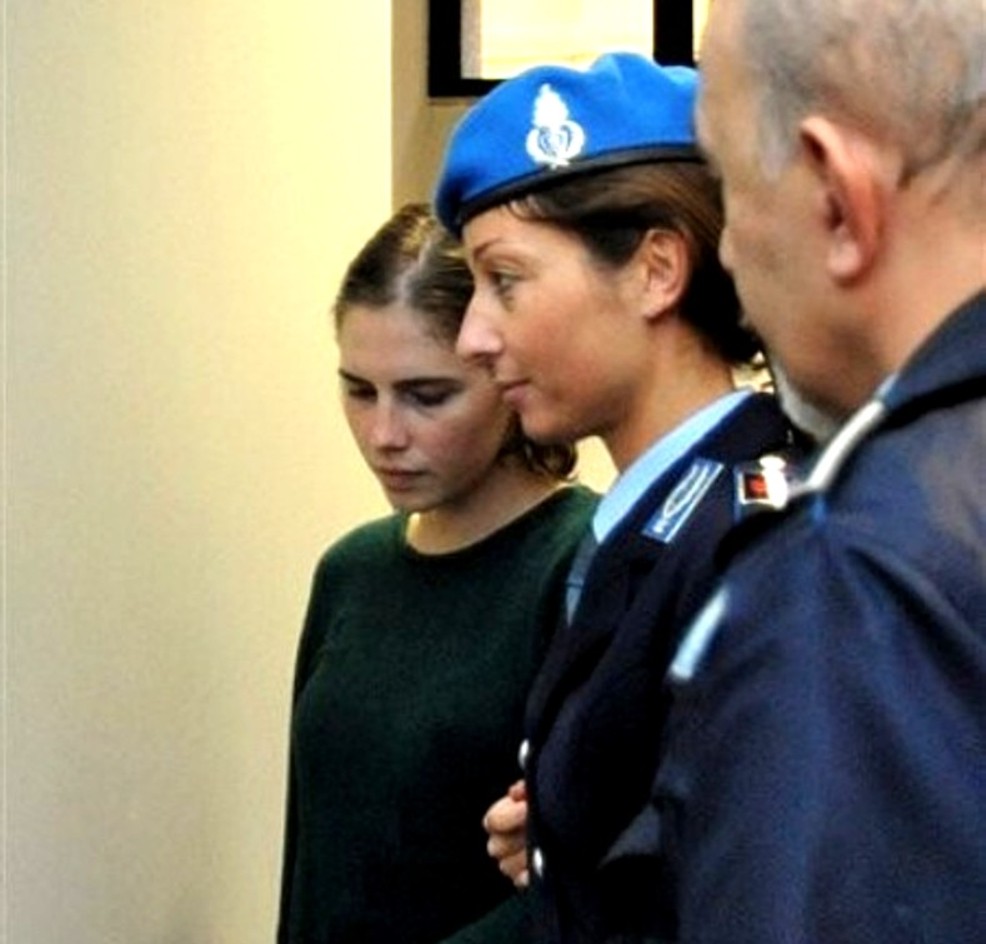
Apparently xenophobia and sliming and serial misconstruing of the evidence isnt working. The Italian authorities continue to be relentless and unblinking.
In court today, Amanda Knox was indicted by the judge and she WILL stand full trial next May for calunnia. This first report on the BBC News website as follows.
American student Amanda Knox is to face trial for slander after saying police beat her during questioning over the killing of Briton Meredith Kercher.
A judge made the decision at a closed indictment hearing in Perugia, Italy.
Knox, 23, told the judge she never intended slander and was just trying to defend herself, her lawyer said.
Ann Wise of ABC News adds this.
American student Amanda Knox was indicted for a second time by an Italian court today, this time for allegedly slandering Italian police for saying they were abusive when they interrogated her for the murder of her roommate.
Knox, who was convicted last year of murdering Meredith Kercher and sentenced to 26 years in prison, stood up in court and made what Italian legal officials call a “spontaneous statement” before the judge’s ruling.
“I have always tried to defend myself. I never wanted to offend or slander anyone,” Knox said in Italian.
Nevertheless, preliminary hearing Judge Claudia Matteini indicted Knox, 23, for slander.
The charge refers to Knox’s testimony during her murder trial that Italian police were rough with her when they interrogated her overnight just days after Kercher’s body was found in a pool of blood in the house they shared.
She claimed the officers yelled at her, discouraged her from calling a lawyer and cuffed the back of her head. The 12 officers named in the slander complaint have denied being abusive to Knox.
At the end of the long interrogation, Knox signed a statement in which she said she had a confused dream-like recollection of being in the house and hearing Kercher scream, effectively placing her on the scene of the crime.
Knox’s lawyer Carlo Dalla Vedova said Knox was “saddened” by the decision.
Another lawyer for Knox, Maria Del Grosso, told reporters that “for Amanda this (interrogation) was the genesis for her homicide accusation. She is very frustrated and obviously disappointed, but she knows that today’s was only a preliminary hearing and the truth was not ascertained today. Let’s hope it is when the case is debated because there was something that went wrong that night.”
Knox was driven into the courthouse in a police van with darkened windows. The hearing was closed to the public, but photographers were able to get a glimpse of her in the courtroom hallways. Looking thinner and drawn, Knox wore a dark green sweater and black pants, her hair is a jaw-length bob.
Before the hearing, Knox’s stepfather Chris Mellas told ABC News that “Amanda is doing better. She is rightfully angry about the slander accusations, and told me she was going to speak out in court this morning. She told me she wanted to tell them that she sees police interrogations shown on TV all the time, and would like to know why her interrogation was not recorded or videotaped.”
But according to her lawyers, she limited her statement to saying she was just defending herself and did not want to offend.
Knox will go to trial for slander on May 17, 2011 before a single judge, Cecilia Bellucci. Matteini said the case needed to go to trial to resolve some formal technical matters, and to debate the accusations, possibly with witnesses.
The lawyer for eight of the police officers, Francesco Maresca, said that the “framework of the request for an indictment was confirmed, and now we await the debate.”
Conviction of the charge could add as much as six years to Knox’s prison sentence.
Again, this is the nexus of Amanda Knox’s accusation against poor Patrick Lumumba who spent two terrifying weeks in Capanne Prison and later lost his business when the customers fled.
Whatever else she may be, Knox does seem to be a serial blamer of others. Blaming the cops for her blaming Patrick, Knox seemed to us to think, was an easy way out.
Italian reports say that she seemed to be scowling or sour or very serious or depressed (no mention of nervousness) and that she had put on a few pounds.
Sunday, October 31, 2010
Corruption Of Appeal: Angry Top Criminal Judge Chiari Is Blatantly Forced Aside
Posted by Peter Quennell

Umbria’s top criminal judge Sergio Matteini Chiari
Very Dirty Business
Only one month ago Umbria’s top criminal judge Sergio Matteini Chiari was to preside.
Now a very angry Judge Chiari has been forced aside with no public explanation from Chief Judge De Nunzio [image below] as to why.
A wildly wrongly qualified judge, Hellmann, a business judge with just two criminal trials in his past, both fiascos, mysteriously takes his place.
Rumors of foul play are appearing in the Italian media. Has Chief Judge De Nunzio been leaned upon politically? Do big bucks or rogue masons have any role in this?
Please click here for more
Friday, October 01, 2010
1 October 2010: Seattle PI’s Italy Based Reporter Andrea Vogt On Where Everything Stands
Posted by Peter Quennell

Former crack prosecutor Judge Chiari who once took an ex-Prime Minister down
Overview Of This Post
Another of those very useful roundup reports from Andrea Vogt, which contains some new points of real interest.
1) On Judge Sergio Matteini Chiari
When Bongiorno steps into the appellate courtroom to defend Sollecito, the judge will look familiar. Respected magistrate Sergio Matteini Chiari represented the prosecution during the controversial Andreotti appeals trial a decade ago in Perugia over the mafia murder of journalist Mino Pecorelli. Biscotti also defended a Cosa Nostra mafioso in that case.
Biscotti and Nicodemo Gentile, who represented Guede, have picked up a number of other high-profile Italian cases while awaiting Guede’s supreme court trial, scheduled for Dec. 16. The duo also represent the family of a murdered transvestite embroiled in a political scandal, as well as the family of a young girl gone missing from Taranto in August.
2) On the RS & AK appeal
The Knox and Sollecito appeal is scheduled to commence late in November.
Knox’s attorneys are soon expected to file “motivi aggiunti” or “additional motives” for appeal. That can include new evidence or witnesses defense attorneys think should be considered. The lead prosecutor—a substitute sitting in while a while a permanent replacement for the position is considered—will be joined by the two public ministers who originally prosecuted Knox and Sollecito; Giuliano Mignini and Manuela Comodi.
“We did not request to be involved,” said Mignini, reached by seattlepi.com this week. “In fact we thought we had wrapped up our duties with the conviction in the first trial. But when we were asked, we gave our availability.”
The appeals trial process will differ in many ways from the first trial. Only the makeup of the court—six lay jurors and two professional judges—remains the same. It will likely proceed much faster because the court is mostly debating Judge Massei’s judgment, not rehearing witnesses or re-examining evidence, though the court can specifically request to rehear key witnesses and the Knox and Sollecito defense teams have filed requests for an independent evaluation of certain pieces of contested evidence.
3) On possible outcomes from the appeal
On appeal, the case is once again wide open, as the court could do anything from giving Knox a harsher life-in-prison sentence to turning over her conviction.
“The court can review all the same evidence presented in the first trial, but simply decide that there is reasonable doubt, that they don’t believe it,” explained University of Parma criminal procedure professor Stefano Maffei.
The court also can agree with prosecutors, who are also appealing the 26-year-sentence and asking for life, and give her even more prison time. Or, the court can agree with the murder conviction, but find that mitigating factors outweigh the aggravated ones, which leads to a one-third reduction in sentence.
That is a most likely scenario, court observers such as Maffei say, especially since more than 18 Italian magistrates have reviewed the evidence in the Knox case and come to the same conclusion of culpability, which somehow ingrains the decision into the judiciary. For reasons that are sociological rather than legal—such as good behavior, political pressure, changed public opinion or prison crowding—sentences in Italy are often reduced on appeal.
“The tradition in this country remains that the court of appeal is usually more lenient than the court of first instance,” Maffei said.
4) On Amanda Knox’s slander trial
Knox will leave the prison for the first time in months [today] Friday. She’ll be shuttled in a police van into a protected side entrance to the courtroom, far from the media, which won’t be allowed into the closed-door hearing where “mostly technical” issues will be discussed.
She is charged with slander for accusing the Perugia police of hitting her as she was being interrogated the night before her arrest. During the course of the questioning, police became suspicious and turned up the heat over the course of several hours. Knox testified that they called her a liar and cuffed her on the back of the head twice while urging her to tell the truth. Multiple police officers and two interpreters who were in and out during the questioning deny such abuse took place and tell their own gentler version of how the night unfolded.
Unless one side produces audio or video of the questioning—which police and prosecutors have said does not exist because Knox was just a witness, not a suspect, when questioning began—it is likely to remain her word against theirs.
The presiding judge Friday (Claudia Matteini, the same judge who signed Knox’s original arrest warrant in 2007) could decide to hold an abbreviated trial, where everything is done behind closed doors and only documentary evidence is presented. She could decide there is enough evidence to move forward with a trial (or not). She could also simply choose to archive the case without passing judgment on its merit. Francesco Maresca, who represented the victim’s family during the Knox trial, represents the police in the case.
Here is our own take from trial reporting and the Massei Sentencing Report on what actually happened in the witness interview that night. Amanda Knox was thrown by Sollecito cutting her loose. (He has never since provided her cover.) But she did not confess - far from it. She fingered Patrick Lumumba. And as a suspect, she always had a lawyer present in subsequent interrogations.
More in the report too, on the movies, the books, and what it is really like to be serving one’s time It sounds punishing.
Friday, June 25, 2010
Amanda Knox’s Supporters Obtain Rome Embassy Cables About Knox, Prove Of No Help
Posted by True North
The American Embassy in Rome above, and the State Department in Washington below.
Ninety-nine percent of the reason why countries put embassies in other countries is because they really want to get along.
The US and Italy in fact do get along, extremely well, and there are thousands of transactions between the two countries every day. Thousands of Americans live in Italy, and millions of Americans are of Italian descent.
At the request of the US Administration, the Italian government recently put a large contingent of Italian troops in Afghanistan.
Under the US Freedom of Information Act, any American citizen can request and usually obtain astonishing amounts of official documentation, far beyond what can usually be extracted from the bureaucracies in most other countries.
Occasionally this information has embarrassed the department concerned, or the party in power in the Congress or the White House. But usually the documents are innocuous and without drama. Conspiracies simply never show up.
The blogger History Punk on his website Historiographic Anarchy has posted some cables (pdf format) from Rome to Washington, which report periodically on the Rome Embassy’s monitoring of Amanda Knox in Capanne Prison and her trial and appeals in Perugia.
As we would expect, these cables are extremely mundane. They were sent by a middle-level official in the consular section of the Rome Embassy to the Italy desk in the State Department.
They report carefully on the careful Italian legal process, and they never remark on anything wrong. No charges or claims or complaints are relayed from Amanda Knox. There is no talk of any anti-Americanism. No instructions, questions or comments are cabled from Washington in return.
One cable was not released. It was marked confidential and the contents are unknown. Here’s a guess at its contents: “Please keep those xenophobic ranters on a chain - they are doing the American cause in Italy no good at all”.
My first post here on TJMK and proud of it. This is a good fight I join.

